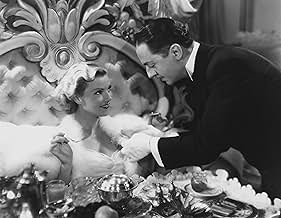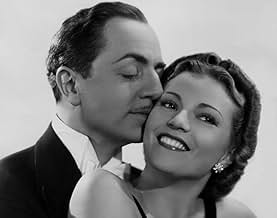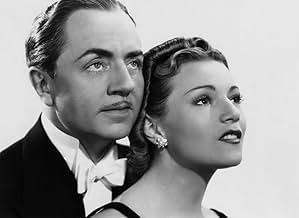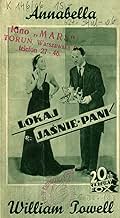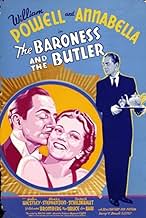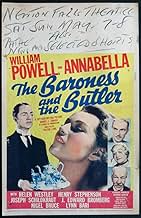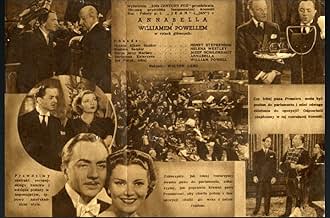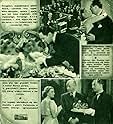Füge eine Handlung in deiner Sprache hinzuA butler gets elected to the Hungarian parliament where he opposes his master's government.A butler gets elected to the Hungarian parliament where he opposes his master's government.A butler gets elected to the Hungarian parliament where he opposes his master's government.
- Auszeichnungen
- 2 wins total
Ivan F. Simpson
- Count Dormo
- (as Ivan Simpson)
Sidney Bracey
- Member of Parliament
- (as Sidney Bracy)
Empfohlene Bewertungen
To introduce French film star Annabella to American audiences, 20th Century Fox got a European type product as a fitting vehicle for her. And to play the butler who goes to Parliament, Darryl Zanuck obtained the services of William Powell from MGM.
Like that other favorite butler role that Powell essayed in My Man Godfrey, Powell is a butler with a social conscience, a fact he keeps hidden from his employers Henry Stephenson, Helen Westley and their daughter Annabella. How he kept secret the fact that his left wing party has nominated him for a seat in the Hungarian Parliament is beyond me. Nevertheless on election eve the family learns that Stephenson will be returned as Prime Minister and Powell will be occupying a seat on the back bench.
The Baroness And The Butler is the kind of film that would have been made in any number of European countries, a delightful bit of Frou-Frou that definitely did not have any relation to Hungary in 1938 with Admiral Miklos Horthy running things as a fascist learning military dictator. Those parliamentary elections have about as much relevance as those that were still going on in Nazi Germany where Reichstag elections were dutifully held with only one party being allowed to participate.
Still Powell and Annabella are nothing less than charming and capable players and they pull this film through and you can actually enjoy it if you'll completely suspend disbelief. Of course Powell and Annabella are in love, but she's unhappily married to a philandering Joseph Schildkraut. And Schildkraut like Captain O'Shea in Ireland is going to make the scandal make his career. As usual Schildkraut is letter perfect playing the part of an unscrupulous schemer, characteristics he patented at the height of his career.
If you're a fan of the stars you'll enjoy The Baroness And The Butler.
Like that other favorite butler role that Powell essayed in My Man Godfrey, Powell is a butler with a social conscience, a fact he keeps hidden from his employers Henry Stephenson, Helen Westley and their daughter Annabella. How he kept secret the fact that his left wing party has nominated him for a seat in the Hungarian Parliament is beyond me. Nevertheless on election eve the family learns that Stephenson will be returned as Prime Minister and Powell will be occupying a seat on the back bench.
The Baroness And The Butler is the kind of film that would have been made in any number of European countries, a delightful bit of Frou-Frou that definitely did not have any relation to Hungary in 1938 with Admiral Miklos Horthy running things as a fascist learning military dictator. Those parliamentary elections have about as much relevance as those that were still going on in Nazi Germany where Reichstag elections were dutifully held with only one party being allowed to participate.
Still Powell and Annabella are nothing less than charming and capable players and they pull this film through and you can actually enjoy it if you'll completely suspend disbelief. Of course Powell and Annabella are in love, but she's unhappily married to a philandering Joseph Schildkraut. And Schildkraut like Captain O'Shea in Ireland is going to make the scandal make his career. As usual Schildkraut is letter perfect playing the part of an unscrupulous schemer, characteristics he patented at the height of his career.
If you're a fan of the stars you'll enjoy The Baroness And The Butler.
"The Baroness and the Butler" is a 1938 film starring William Powell and the French star signed by 20th Century Fox, Annabella, who got the big star buildup from Fox. Little did Darryl F. Zanuck know that she was more interested in matters of the heart than career. When she met and fell in love with Tyrone Power on her next film, "Suez," Zanuck tried to get rid of her by offering her films in Europe. She refused to leave Power (and who could blame her) and the two married, becoming the Brangelina of their era. Zanuck blacklisted her, and there went the star buildup and the big film career.
This is a charming film set in Hungary, about a butler, Johann Porok (Powell) who works for the Prime Minister (Henry Stephenson). The prime minister and his family, particularly his daughter Katrina (Annabella) are shocked when Johann is elected to Parliament - by the opposition party. What's more, he wants to stay on as butler. Meanwhile, Katrina's philandering husband (Josef Schildkraut) has a few political ambitions of his own.
Powell does a smooth job in this film as the elegant butler who is known for his brilliant speeches in Parliament. Stephenson is great as his amused boss, and Schildkraut, who played so many slimeballs, is terrific as usual. Annabella was a wonderful actress, and when her film career took a nosedive thanks to Zanuck, she and Power did radio shows together. Annabella also had a great success on Broadway, did "Liliom" with her husband in Westport Connecticut, and worked tirelessly for the war effort before returning to France when she and Power divorced.
"The Baroness and the Butler" isn't a great film, but it has good performances and a breeziness about it. Enjoyable if predictable.
This is a charming film set in Hungary, about a butler, Johann Porok (Powell) who works for the Prime Minister (Henry Stephenson). The prime minister and his family, particularly his daughter Katrina (Annabella) are shocked when Johann is elected to Parliament - by the opposition party. What's more, he wants to stay on as butler. Meanwhile, Katrina's philandering husband (Josef Schildkraut) has a few political ambitions of his own.
Powell does a smooth job in this film as the elegant butler who is known for his brilliant speeches in Parliament. Stephenson is great as his amused boss, and Schildkraut, who played so many slimeballs, is terrific as usual. Annabella was a wonderful actress, and when her film career took a nosedive thanks to Zanuck, she and Power did radio shows together. Annabella also had a great success on Broadway, did "Liliom" with her husband in Westport Connecticut, and worked tirelessly for the war effort before returning to France when she and Power divorced.
"The Baroness and the Butler" isn't a great film, but it has good performances and a breeziness about it. Enjoyable if predictable.
... OR "Mr. Godfrey Goes to Budapest". So, yes, it's a pretty obvious rework of "My Man Godfrey" from 1936. But then "The Star of Midnight" and "The Ex Mrs. Bradford" were reworkings of "The Thin Man" formula and they worked.
Johan Porok (William Powell) is a third generation head butler to Count Sandor (Henry Stephenson) and his family. The count praises him for his dedication to "all of the ancient arts" of being a perfect servant. Count Sandor is prime minister of Hungary, so he is naturally interested in the outcome of the parliamentary elections. To his surprise, his butler Johan has been elected to a seat in parliament. Here is my first problem. How could Sandor's own butler be running for parliament and the prime minister not be aware?
Johan ran on the progressive ticket, and the count is a member of the conservative party, so they are at odds politically speaking. And Johan quickly rises to be a leader in his party, largely by regularly skewering his employer's performance in office. Sandor doesn't mind this, but his daughter the titular baroness (Annabella), does seem to mind a great deal. Here's some more weirdness to ponder. The baroness is married to the Baron Georg Marissey (Joseph Schildkraut), but routinely sleeps in her old room at her parents' house. She is apparently somewhat estranged from the baron although not truly separated. With Schildkraut in the part of the baron, one can only assume it is because he is some kind of slimy little weasel - Schildkraut excelled at such roles - but the source of her initial antipathy is never really revealed.
The title and having watched "My Man Godfrey" will somewhat give the outcome away, but how this happens within the bounds of the production code is something you will have to watch and find out yourself. Besides what I already mentioned, there was just something off about this production. For one thing, Annabella's accent makes her almost incomprehensible at times. I also never feel any authenticity in the Baroness' positive feelings towards Johan.
It was fun watching Powell play a politician for a change, though. He is quite the socialist in this production. He advocates redistributing farmland to the peasants - Hey Johan who exactly is going to have to "donate" this land in your scheme? - and he also advocates a reduction in armaments. If Johan recognized the winds of war that were in the air in Europe in1938, perhaps he would want to hold on to those armaments.
I'd say this film is probably a 6.5 rather than a 6 or a 7/10 if I was permitted a score with more granularity.
Johan Porok (William Powell) is a third generation head butler to Count Sandor (Henry Stephenson) and his family. The count praises him for his dedication to "all of the ancient arts" of being a perfect servant. Count Sandor is prime minister of Hungary, so he is naturally interested in the outcome of the parliamentary elections. To his surprise, his butler Johan has been elected to a seat in parliament. Here is my first problem. How could Sandor's own butler be running for parliament and the prime minister not be aware?
Johan ran on the progressive ticket, and the count is a member of the conservative party, so they are at odds politically speaking. And Johan quickly rises to be a leader in his party, largely by regularly skewering his employer's performance in office. Sandor doesn't mind this, but his daughter the titular baroness (Annabella), does seem to mind a great deal. Here's some more weirdness to ponder. The baroness is married to the Baron Georg Marissey (Joseph Schildkraut), but routinely sleeps in her old room at her parents' house. She is apparently somewhat estranged from the baron although not truly separated. With Schildkraut in the part of the baron, one can only assume it is because he is some kind of slimy little weasel - Schildkraut excelled at such roles - but the source of her initial antipathy is never really revealed.
The title and having watched "My Man Godfrey" will somewhat give the outcome away, but how this happens within the bounds of the production code is something you will have to watch and find out yourself. Besides what I already mentioned, there was just something off about this production. For one thing, Annabella's accent makes her almost incomprehensible at times. I also never feel any authenticity in the Baroness' positive feelings towards Johan.
It was fun watching Powell play a politician for a change, though. He is quite the socialist in this production. He advocates redistributing farmland to the peasants - Hey Johan who exactly is going to have to "donate" this land in your scheme? - and he also advocates a reduction in armaments. If Johan recognized the winds of war that were in the air in Europe in1938, perhaps he would want to hold on to those armaments.
I'd say this film is probably a 6.5 rather than a 6 or a 7/10 if I was permitted a score with more granularity.
10CKohls
It is rare that I come upon a classic film I like this much. Comedy, drama, a charming story, all well produced and satisfying. I am not a fan of screwball comedies or slapstick, and a lot of times that's what people think of when they think of classic comedy, which is a shame. Much of the comedy in this film could be used today. William Powell is brilliant as ever. Annabella is stunning. Henry Stephenson is charming. He reminds me of a friendly C. Aubrey Smith. And they were in fact cast together in Little Lord Fountleroy (which, if you haven't seen, is an excellent forgotten classic). I can't recommend this film highly enough. Someone has uploaded it to youtube recently, which is where I watched it.
Hungarian Prime Minister "Count Albert" (Henry Stephenson) is having a family breakfast on the morning after the election when he hears news on the radio that his butler "Johann" (William Powell) has been elected to Parliament - and for the opposition party too! He's quite a savvy and decent old chap and offers his congratulations. In turn, "Johann" promises to continue to take care of his master whilst performing his new parliamentary duties. It turn out that he's quite an effective politician and that although they are not quite of the same social class, he and the "Baroness" (Annabella) - who is married to "Baron Georg" (Joseph Schildkraut) - start one of those love/hate relationships that can only end one way. With the odd, slightly confusing, appearance from Nigel Bruce and a Stephenson who looks like he's enjoying the mischief of it all, I found this to be an entertaining swipe at the principles of declining aristocratic rule and of the aspiring hope of the people in a new order with all of the same problems. Powell is on good form here but Annabella isn't very natural nor entirely at home with the English language. Still - as "Johann" says - "there are always difficulties"! I quite enjoyed this.
Wusstest du schon
- WissenswertesThe film was rejected by the censors in Quebec, Canada while the Romanian censors removed all references to Hungary.
- PatzerEarly in the film, Powell's character can be seen using a tea trolley with a large map of and coat of arms prominently displayed on its back. Both represent Australia, not Hungary, where the film is set.
- Zitate
Johann Porok: My congratulations sir.
Count Albert Sandor: For what?
Johann Porok: Your triumph.
Count Albert Sandor: Oh - that. You'd think at my age I'd have sense enough to get out of politics instead of wasting all my time with a lot of nincompoops and parasites.
- VerbindungenReferenced in Hollywood Hist-o-Rama: William Powell (1961)
- SoundtracksTales From the Vienna Woods Op. 325
(1868) (uncredited)
Written by Johann Strauss
In the score for the opening scenes
Top-Auswahl
Melde dich zum Bewerten an und greife auf die Watchlist für personalisierte Empfehlungen zu.
- How long is The Baroness and the Butler?Powered by Alexa
Details
- Erscheinungsdatum
- Herkunftsland
- Sprache
- Auch bekannt als
- Baronica in njen sluga
- Drehorte
- Budapest, Ungarn(Stock Footage)
- Produktionsfirma
- Weitere beteiligte Unternehmen bei IMDbPro anzeigen
- Laufzeit
- 1 Std. 20 Min.(80 min)
- Farbe
- Seitenverhältnis
- 1.37 : 1
Zu dieser Seite beitragen
Bearbeitung vorschlagen oder fehlenden Inhalt hinzufügen

